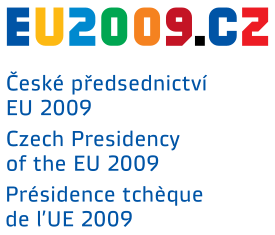Czech EU Council Presidency 2009
Czech EU Presidency 2009 logo |
|
|---|---|
| country |
|
| Term of office | January 1, 2009 - June 30, 2009 |
| Chair |
Mirek Topolánek (until May 8, 2009) Jan Fischer (from May 9, 2009) |
| Web presence | http://www.eu2009.cz |
| chronology | |
| ◀ France | Sweden ▶ |
The Czech EU Council Presidency in the first half of 2009 marks the Czech Presidency of the Council of the European Union and the European Council . According to the schedule, the Czech Prime Minister Mirek Topolánek became Chairman of the European Council on January 1, 2009 . The remaining members of the Topolánek II government took over the leadership of the various formations of the Council of the European Union; Foreign Minister Karel Schwarzenberg chaired the Council for General Affairs and External Relations . After Topolánek was overthrown in March 2009, the non-party Jan Fischer officially took over the affairs of state on May 9th, so that the Council presidency was now taken over by the members of the Fischer government . On July 1, 2009, the presidency of the Council passed to Sweden .
subjects
At the beginning of the Czech EU Council Presidency, two foreign policy issues shaped the political agenda: on the one hand the Israeli military offensive in the Gaza Strip, Operation Cast Lead, and on the other hand the Russian-Ukrainian gas dispute . In both cases, the European Union found it difficult to find a common position and to help resolve the conflict.
In addition, the EU Council Presidency continued to deal with the financial crisis that has persisted since 2007 . An extraordinary summit of the European Council took place on this topic on March 1st, 2009 , and the first regular summit from March 20th to 22nd was mainly about the financial crisis and the search for a common position before the G20 - Dominates the meeting in early April. Another extraordinary summit to tackle unemployment collectively, planned for May 2009, was canceled due to French efforts following social unrest in France.
In addition, the ratification of the Lisbon Treaty made further progress during the Czech Presidency , especially in the Czech Republic itself. After a ruling by the Constitutional Court, which found the Treaty to be in conformity with the Czech Constitution, the parliamentary ratification process was completed here. However, the Czech President Václav Klaus refused to sign the ratification document as long as Ireland, which had rejected the treaty in a referendum in 2008, did not support it in a second referendum. Such a second referendum was planned for October 2009.
Another foreign policy focus of the Czech Presidency was the founding summit for the Eastern Partnership on May 7, 2009. This project was particularly promoted by the Czech government in order to strengthen the Eastern dimension within the framework of the European Neighborhood Policy . Prior to this, during the French Presidency in 2008, the Union for the Mediterranean was founded , which aimed primarily at the southern dimension.
The 2009 European elections (June 4th to 7th) also fell during the period of the Czech Council Presidency. At the European Council on June 18 and 19, the heads of state and government of the EU member states discussed the election results and voted for José Manuel Barroso as President of the European Commission for a second term without, however, formally nominating him. The mandate of the Barroso I Commission expires in November 2009; however, a possible extension of their mandate was discussed in order to be able to appoint the new Commission under the provisions of the Lisbon Treaty.
No confidence in the Czech government in March 2009
A peculiarity of the Czech presidency was the fact that the conservative-bourgeois government Topolánek did not have a stable majority in the Czech parliament, but was dependent on several independent MPs. She had already barely survived several votes of no confidence initiated by the social democratic opposition , so that the Czech press speculated about a possible change of government during the Council presidency. In fact, there was another vote on March 24, 2009, in which a narrow majority of MPs voted for the resignation of the government. However, it was a destructive vote of no confidence; so it was not automatically linked to the appointment of a new head of government. Rather, the Czech President, Václav Klaus , was given the task of appointing a new candidate to form a government. On April 5, 2009, the leading Czech parties agreed to set up a technocratic transitional government under the leadership of the non-party Jan Fischer (previously head of the Czech Statistical Office). The Fischer government took office on May 8th and is expected to govern the country until the new elections on May 28th and 29th, 2010 .
Web links
Individual evidence
- ↑ EurActiv, March 25, 2009: EU summit canceled for fear of further unrest .
- ↑ EurActiv 15/06/2009 : Ireland's re-vote affects the appointment of the Commission .
- ↑ EurActiv, March 25, 2009: Europe on “autopilot” after the fall of the Czech government .
| predecessor | Office | successor |
|---|---|---|
| French EU Council Presidency |
EU Council Presidency January 1, 2009 - June 30, 2009 |
Swedish EU Council Presidency |

